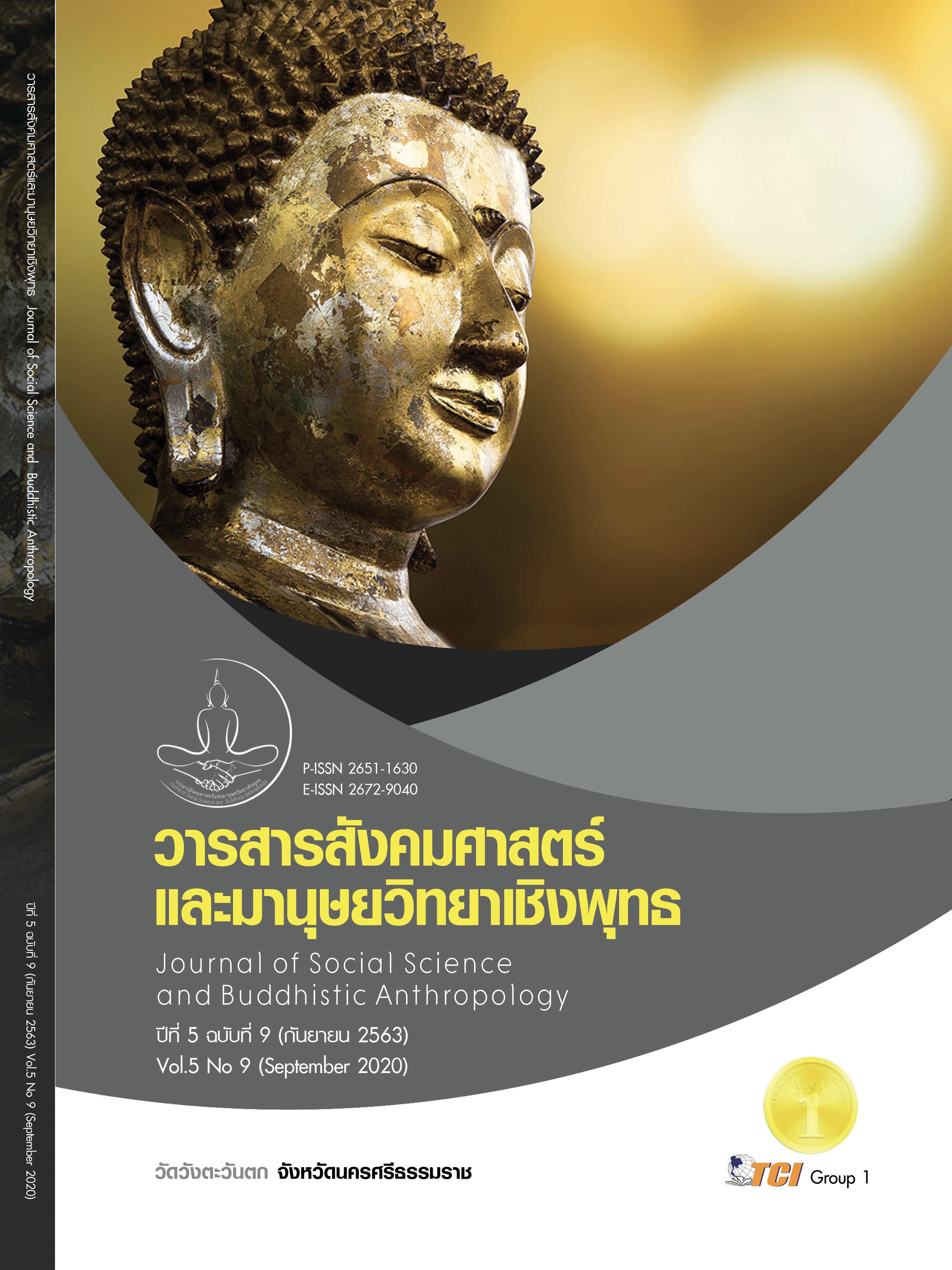THE MODEL OF APPLYING THE ENVIRONMENTAL BUDDHIST PHILOSOPHY IN THE DEVELOPMENT OF ECOLOGICAL CONSCIENCE
Keywords:
Model, Applying, Environmental Buddhist Philosophy, Development, Ecological ConscienceAbstract
The objectives of this research article were to: 1) study the concept of conscience in the environmental protection in accordance with ecology. 2) study the Buddhist philosophy on developing the ecological conscience. 3) cultivate the model of applying Buddhist philosophy of environment for developing the ecological conscience. 4) create a new body of knowledge and model of building conscience of other environmental protection and development. This research was a qualitative one based documentary research and field study on the 20 interviewers who are the knowledgeable and experienced ones concerning the ecological conscience development and methodized by the structure interview upon the analytic, appreciative and applicative approach so as to lead to the creativity of new body of knowledge in philosophy and religion. The results of research were found as follows: The present creation of conscience in the environmental protection by both the legal measure and academic and workshop activities is not enough. It should be added ecological conscience by philosophical and religious perspective based on cultivating the people conscience on the ecosystematic participation for the natural resources and environmental management. Without the people participation, the problem-solution is difficult. It should be applied to Buddhist philosophy, because the Buddhist philosophy has been explained by the principles of the five aspects of natural law, the Dependent Origination and the Three Common Characteristics regarding the understanding the holistic world. The rationality of viewing both human and environment that is the interdependent state is to aim at reminding the human to comprehend by themselves as being oneness with the nature, and then no thinking the world domination selfishly. In the proceeding of developing the eco-conscience, there are the constructing the wisdom to realize the ecological value, growing the mercy with the fivefold precept and five dharma and powering the eco-conscience with four kinds of force. In cultivating the model of eco-conscience development, there are the depicting morality to the people conscience, communities, educational institutes, city administrators, government officials to participate and do peaceful happiness. As for the creativity of new body of knowledge on this research is EC Model = WMP + ECO.
References
พระพรหมคุณาภรณ์ ป.อ. ปยุตฺโต. (2553). การพัฒนาที่ยั่งยืน. กรุงเทพมหานคร: มูลนิธิโกมลคีมทอง.
จักรพรรณ วงศ์พรพวัณ. (2562). นิเวศวิทยาเชิงพุทธกับแนวคิด คุณค่า และการเสริมสร้างการอนุรักษ์ป่า ชุมชนในจังหวัดขอนแก่น. วารสารวิชาการธรรมทรรศน์, 19(1), 215 - 226.
เนื่องน้อย บุญยเนตร. (2537). จริยศาสตร์สภาวะแวดล้อม: โลกทัศน์ในพุทธปรัชญาและปรัชญาตะวันตก. กรุงเทพมหานคร: จุฬาลงกรณ์มหาวิทยาลัย.
ประเวศ อินทองปาน. (2562). พระพุทธศาสนากับสิ่งแวดล้อม (พิมพ์ครั้งที่ 3). กรุงเทพมหานคร: สำนักพิมพ์มหาวิทยาลัยเกษตรศาสตร์.
พระธรรมปิฎก (ป.อ. ปยุตโต). (2541). การพัฒนาที่ยั่งยืน. กรุงเทพมหานคร: มูลนิธิโกมลคีมทอง.
พระพรหมคุณาภรณ์ (ป.อ.ปยุตฺโต). (2558). พจนานุกรมพุทธศาสน์ ฉบับประมวลธรรม. กรุงเทพมหานคร: ผลิธัมม์.
พระภัสกรณ์ สุวุฑฺโฒ (นนนุศาสตร์). (2558). ศึกษาวิเคราะห์หลักนิเวศวิทยาตามแนวพุทธปรัชญาเถรวาท. วารสารมหาวิทยาลัยมหามกุฏราชวิทยาลัย วิทยาเขตร้อยเอ็ด, 5(1), 271 - 283.
พระมหาศุภชัย สุภทฺโท (เบ้าทอง). (2558). แนวทางการพัฒนาจิตสำนึกสาธารณะเชิงพุทธบูรณาการ. ใน ดุษฎีนิพนธ์พุทธศาสตรดุษฎีบัณฑิต สาขาวิชาพระพุทธศาสนา. มหาวิทยาลัยมหาจุฬาลงกรณราชวิทยาลัย.
พระราชวรมุนี (พล อาภากโร) และคณะ. (2558). นิเวศวิทยาเชิงพุทธบูรณา การเพื่อการพัฒนาที่ยั่งยืนในการเสริมสร้างสุขภาวะและการเรียนรู้ของสังคมไทย. วารสารสังคมศาสตร์ และมนุษยศาสตร์, 41(2),32 - 48.
มหาจุฬาลงกรณราชวิทยาลัย. (2539). พระไตรปิฎกฉบับภาษาไทย ฉบับมหาจุฬาลงกรณราชวิทยาลัย. กรุงเทพมหานคร: โรงพิมพ์มหาจุฬาลงกรณราชวิทยาลัย.
มหาจุฬาลงกรณราชวิทยาลัย. (2539). พระไตรปิฎกภาษาไทย ฉบับมหาจุฬาลงกรณราชวิทยาลัย. กรุงเทพมหานคร: โรงพิมพ์มหาจุฬาลงกรณราชวิทยาลัย.
วิสาร นามวา. (2558). การปลูกสร้างจิตสำนึกในการอนุรักษ์ทรัพยากรธรรมชาติและสิ่งแวดล้อมแก่เยาวชนลุ่มน้ำโขง. วารสารบัณฑิตวิทยาลัย พิชญทรรศน์ มหาวิทยาลัยราชภัฏอุบลราชธานี, 10(2), 87 - 93.
สมบูรณ์ บุญโท. (2553). ปรัชญากระบวนทรรศน์กับการพัฒนามนุษย์ สังคมและธรรมชาติสิ่งแวดล้อม. กรุงเทพมหานคร: สำนักพิมพ์ สวนโลก-สวนธรรม.
สำนักงานคณะกรรมการพัฒนาการเศรษฐกิจและสังคมแห่งชาติ (สศช.). (2559). แผนพัฒนาเศรษฐกิจ และ สังคมแห่งชาติ ฉบับที่ 12 พ.ศ. 2560-2564. เรียกใช้เมื่อ 25 เมษายน 2561 จาก http: www.nesdb.go.th/ Default.axpx?tabid395
อภิชัย พันธเสน. (2558). พุทธเศรษฐศาสตร์ วิวัฒนาการ ทฤษฎี และการประยุกต์กับเศรษฐศาสตร์สาขาต่าง ๆ (พิมพ์ครั้งที่ 4). กรุงเทพมหานคร: อมรินทร์.
Passmore J. (1974). Man’s Responsibility for Nature. London: Duckworth.









